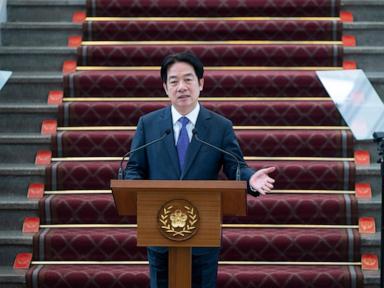China’s Foreign Ministry has criticized the United States for revising a government fact sheet to remove its opposition to Taiwan independence, accusing Washington of sending the wrong message to separatist forces. The move has raised concerns over potential policy shifts under President Donald Trump, who returned to the White House last month.
China says US has ‘gravely backpedaled’ on Taiwan

Key Takeaways:
- China claims the U.S. has ‘gravely backpedaled’ on its Taiwan policy after a fact sheet revision.
- The U.S. State Department removed the phrase opposing Taiwan independence from its official documentation.
- Taiwan welcomes the U.S. changes but is concerned about shifts in American support under President Trump.
- It’s unclear whether the fact sheet revision signals a significant policy change by the U.S.
- China’s criticism highlights increasing tensions in U.S.-China relations over Taiwan.
China Accuses U.S. of Backpedaling on Taiwan Policy
China Criticizes U.S. Fact Sheet Revision
BEIJING — China’s Foreign Ministry has taken issue with a recent revision of a U.S. government fact sheet that omitted language expressing American opposition to Taiwan independence. Ministry spokesperson Guo Jiakun stated that the United States has “gravely backpedaled” on its position regarding Taiwan and is sending the wrong message to “separatist forces” on the self-governed island.
Removal of Key Phrase by U.S. State Department
Last week, the U.S. State Department updated its website, removing the phrase “we do not support Taiwan independence” from the fact sheet outlining America’s relations with Taiwan. This change has drawn Beijing’s ire, prompting a stern response from Chinese officials who view the move as a shift in U.S. policy.
Historical Context of Tensions
This is not the first time the State Department has altered this language. In May 2022, the phrase was similarly removed but was reinstated weeks later following strong protests from China. The longstanding U.S. position has been a delicate balancing act, acknowledging Beijing’s “One China” policy while also supporting Taiwan’s self-defense capabilities.
Taiwan’s Response to the Change
Taiwan’s government welcomed the update. In a statement sent to The Associated Press, the Ministry of Foreign Affairs noted the positive and friendly nature of the revised text, reflecting the “close and amicable partnership between Taiwan and the United States.” However, the statement did not specifically mention the language concerning independence.
Uncertainty Under President Trump’s Administration
The fact sheet revision comes amid uncertainties about U.S. policy toward Taiwan under President Donald Trump, who returned to the White House last month. It remains unclear why the State Department altered the language or whether it signals a significant shift in policy. Taiwan is concerned that Trump may not be as steadfast a supporter as his predecessor, former President Joe Biden.
Economic Considerations and Semiconductor Industry
Adding to the complexities, President Trump commented last week on Taiwan’s semiconductor industry. “Trump said last week that Taiwan, a leading maker of semiconductors, had taken the chip business away from the U.S. and that he wants it to come back.” This statement suggests potential economic motives influencing U.S. policy in the region.
China’s Warning and the Taiwan Strait
China has urged the United States to “stop emboldening and supporting Taiwan independence and avoid further damaging China-U.S. relations and the peace and stability of the Taiwan Strait.” The narrow waterway separating Taiwan from China’s east coast has been a focal point of military tensions, with China increasing exercises around the island in recent years.
Background on Taiwan-China Relations
Taiwan and China split in 1949 after a civil war that resulted in the communists taking power in mainland China. The defeated Nationalists fled to Taiwan, establishing a separate government. While Taiwan has its own government and military, it has never declared formal independence from China. Beijing insists that Taiwan must come under its control, by force if necessary.
Implications for Future Relations
The revision of the U.S. fact sheet and the reactions from China and Taiwan highlight the fragile dynamics of international diplomacy in the region. As both superpowers navigate their policies, the peace and stability of the Taiwan Strait hang in the balance, with potential global repercussions.











